As it happened: Election petition day two
Petitioner Amama Mbabazi's lawyers presented their submissions on the second day of the election petition hearing.
At Supreme Court
- Election petition hearing continued on Tuesday
- Amama Mbabazi's lawyers presented their submissions before the Supreme Court
- Four offences were highlighted, including that of bribery
- The issue of the promise of hoes came up . . . and much more
- Court is back in session on Wednesday morning
|
6.35pm: COURT ADJOURNED
Court has been adjourned until Wednesday morning. 9.30am Ugandan time. |
6.25pm: 'Bring an expert'
Counsel Mohammed Mbabazi says that were no valid results from the February 2016 presidential elections because principles were not followed.
"We are saying that what they did was non-compliance but actually, what they did was acting outside the law.
"There's no specific law on use of Biometric Voter Verification Kits," says Mbabazi who asks court to direct the Electoral Commission to bring an expert to demonstrate how the machines work.
5.45pm: Landslide v narrow victory
Byamukama is putting up a spirited argument to his submissions. "What looks like a landslide victory may actually be a narrow victory," he argues.
Court, he says, may not need proof of actual possibility of reversal of results if shown that the instances proved reduce majority to a narrow one. Quite a mouthful from the 'learned friend', huh?
Byamukama is arguing that if the quality of the voting process is poor, then in that case, numbers become irrelevant.
He also says that past Supreme Court rulings set a nearly impossible-to-meet and restrictive test. He points out that a petitioner, in this case Amama Mbabazi, points out a breach and so the respondents, in this case President-elect Yoweri Museveni (first) and the Electoral Commission (second), show whether the breach mentioned was not substantive.
Chief Justice Bart Katureebe says that the rules "we are using give the court power to call anyone to be cross-examined".
Byamukama argues that the current approach does not give court the latitude to be able to inquire whether the election was free and fair.
5.25pm: Final submissions
So did the non-compliance with the law affect the election's final outcome? That's the issue Amama Mbabazi's lawyer Jude Byamukama is dealing with in the final submissions.
He goes on to make reference to judgements from previous presidential petitions (particularly of 2001 and 2006).
His argument is that most of decisions in the 2001 and 2006 petitions on whether non-compliance had an effect on the outcome were wrongly decided.
5.10pm: The hoes
Next up is another of Amama Mbabazi's lawyers, who we have seen already today: Severino Twinobusingye. This time, his submission is on the issue of the promised hoes.
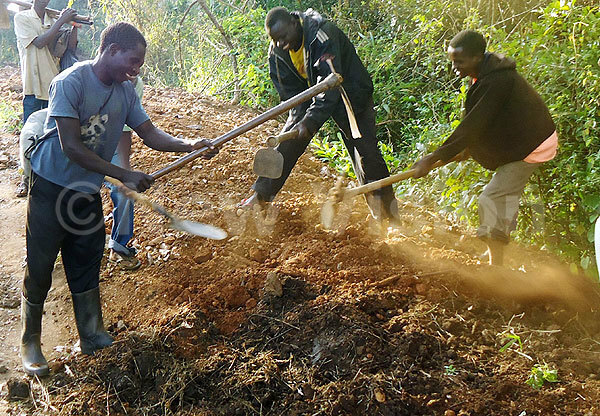
So why is it an offence, you could be wondering?
Twinobusingye says that the accusation of the bribe of the hoes was committed by candidate Yoweri Museveni at a campaign rally in Terego, and not by the president of the Republic of Uganda.
The lawyer goes on to read Prime Minister Dr. Ruhakana Rugunda's letter in which he acknowledged Museveni's directive to purchase 18 million hoes. Mbabazi's lawyer argues that Museveni wanted to woo voters to vote for him when he made the promise.
"This can't be described in other terms than as a bribe," he submits.
As a head of state, the president's duties don't involve promising hoes. There are people responsible for that, submits Twinobusingye.
"We pray that you hold the first respondent accountable on the issue of the hoes and that you annul the election."
4.57pm: The leopard you-know-what
With the "wolf" statement kicked out of the door, Akampurira next talks about the "leopard anus" statement by presidential candidate Museveni on his campaign trail.

The lawyer says that Museveni's comments were derogatory, abusive and insulting to the petitioner, Amama Mbabazi. He insists that the "leopard anus" statement was directed towards the petitioner after the Ntungamo clashes during the election period.
Hold it . . .
The Chief Justice, in response, asks whether the "leopard anus" reference by Museveni was directed towards the petitioner or the attackers. "Making derogatory statements is on one ground.
Akampurira's submission is thus: The four kinds of offenses listed in the Presidential Elections Act, once proven, can lead to nullification of an election.
4.46pm: The 'wolf' issue
In his submission, Akampurira says that the money that was given out by NRM agents helped in aiding interference of electioneering activities of others.
Meanwhile, according to petitioner Amama Mbabazi's affidavit, first respondent (Yoweri Museveni) "made several reckless statements to the effect that he wasn't ready to hand over to wolves".
Akampurira says that the petitioner was not a wolf and neither was he mad, arguing that the aim of Museveni's statements was to put off voters from voting the so-called "mad wolves".
But then, Chief Justice Katureebe asks the lawyer: How did you determine he was the "wolf"? Katureebe points out that the "wolf" statement was made on January 14, 2015. "Was that during the electoral period? Who were the candidates then?" he demands.
Pinned against the wall, Counsel Akampurira let's go of the "wolf" statement.
|
4.35pm: BACK IN SESSION
Court is back in session as Mbabazi's lawyer Akampurira carries on with his submission on electoral offenses |
|
4.05pm: COURT TAKES BREAK
Court goes for a half-an-hour break to allow lawyer Akampurira to peruse his documents. 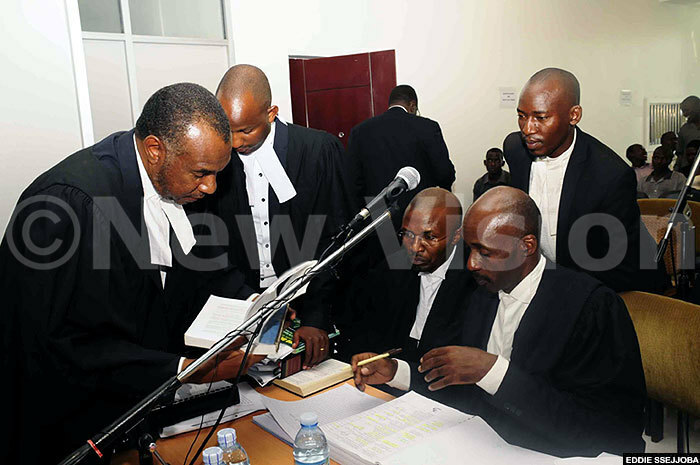
|
4.02pm: People 'shunned our meeting'
Hope Mwesigye's affidavit indicates that the petitioner's supporters became a target. Court is told that petitioner Amama Mbabazi was arrested, detained and later released.
"Some people shunned our meeting after they were given money to stay away," reads Mwesigye's affidavit, adding that "jet fighters kept hovering over our meeting place as though they were landing", something she said scared away their supporters.
4.00pm: 'Interference'
Akumpurira talks about the second claim of offenses related to false statements concerning the character of other candidates in the presidential race.
He then deals with that of interference with election activities of other parties contrary to Section 26 of the Presidential Elections Act. He mentions an incident where as the petitioner, Amama Mbabazi, arrived in Fort Portal during the three-month campaign period, his proceession was attacked by a group of people wearing yellow T-shirts.
Akampurira also talks of Mbabazi's public address (PA) system at Boma Ground that was vandalized reportedly by NRM agents as identified by locals.
"NRM agents interfered with election activities of the petitioner, contrary to Section 26(b) of the Presidential Elections Act," says the lawyer.
He also says that Gen. Henry Tumukunde bribed people to boycott Amama's rally "and indeed when it happened,the grounds were almost empty".
Amama's supporters were tortured and arrested and this was the beginning of intimidation, argues Akampurira.
He reads an affidavit of Hope Mwesigye saying supporters dressed in presidential Amama Mbabazi's T-shirts were imprisoned and tortured.
|
3.40pm: 'Law allows food' On the issue of bribery, the Chief Justice points out that the law allows candidates to hold meetings and even food and refreshments. He tells Counsel Akampurira that he would need to prove more if he wished to relate it with his submission on bribery. 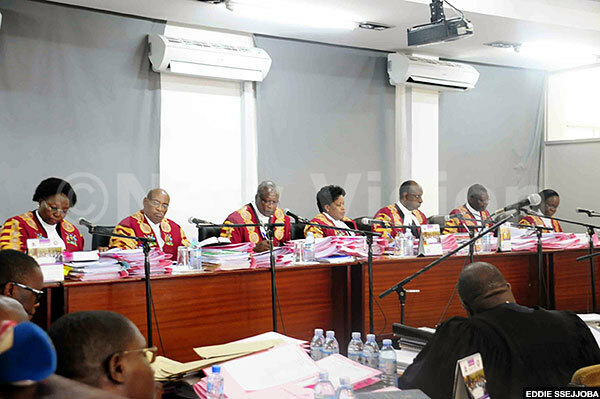
|
3.30pm: Issue of bribery
Responding on the issue of bribery, the Chief Justice says that the bribe given to Kyeyago was not from Museveni but from a Local Council (LC) 1 chairperson.
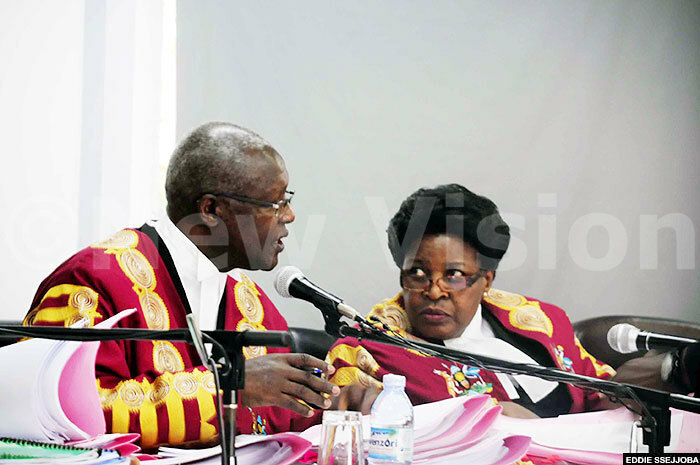
Counsel Akampurira then asks court to treat the various affidavits supporting his bribery allegations as a whole, a request the justices object.
So, the lawyer carries on to another affidavit as he seeks to prove the bribery claim of his submission. He says that all that the affidavits prove is that bribery, despite being done on different days, took place.
3.20pm: Four offences
The submission by Amama Mbabazi's lawyer Akampurira is about electoral malpractices and offences committed during the February 2016 election. He point out four offences:
- Bribery
- False statements concerning the character of other candidates
- Interference of election activities,and
- Making false statements
He reads out an affidavit in support of his submission, first on the bribery claims, saying that the petitioner, Amama Mbabazi, contends that the first respondent (Yoweri Museveni) committed acts of bribery during elections.
He reads an affidavit of a one Kyeyago Ivan: "I received sh200,000. I was told the said money was sent by President Museveni."
"Anyone who contravenes the law on bribery as per the Presidential Elections Act is liable to conviction", translating into imprisonment not exceeding three years, says Akampurira.
"Museveni sending money is a hearsay statement," cuts in President Museveni's lawyer.
"Obviously the money claimed to have been sent cannot vote," argues Chief Justice Bart Katureebe.
3.12pm: 'False representation'
Twinobusingye says that Museveni was not legally nominated and as such, his nomination to run for the presidency was null and void. He adds that the process of nomination by the Electoral Commission was topsy-turvy . . . that Museveni first submitted his papers to the Electoral Commission before his party (NRM) had nominated him, instead of the reverse.
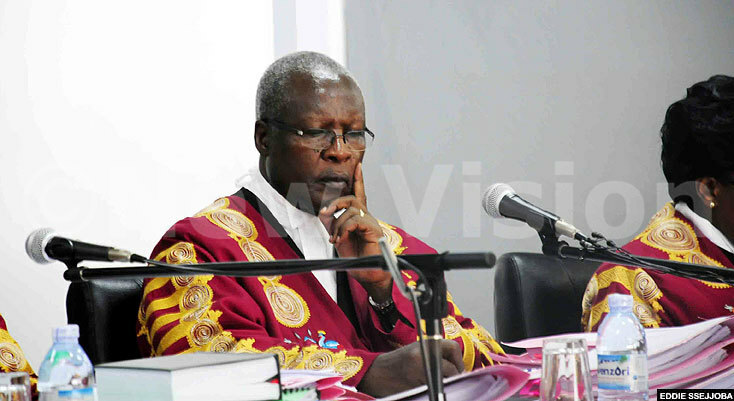
"Section 9 was not complied with. This was done in broad daylight. His nomination was a false representation. There was no delegates conference at the time he [Museveni] submitted his papers to the Electoral Commission, and so the Electoral Commission ought to have rejected the NRM leader's documents.
"This nomination was null and void, irregular and unlawful to the extent that this infarction was committed," argues Twinobusingye.
Chief Justice Katureebe tells Twinobusingye to "back your allegations with evidence".
"I would like to leave this point at that," says Twinobusigye, before giving way for his fellow lawyer Akampurira Michael.
2.50pm: Museveni's nomination
Well, for a moment there, the court session will briefly pause as court searches for copies of submitted documents. "Bear with us," says Chief Justice Katureebe, who says that "We seem to have different documents yet we want to move with you".
Lawyer Twinobusingye submits that first respondent [President-elect Yoweri Museveni] did not comply with Section 9 and Section 10(a) of the Presidential Elections Act when he submitted his nomination papers to the Electoral Commission.
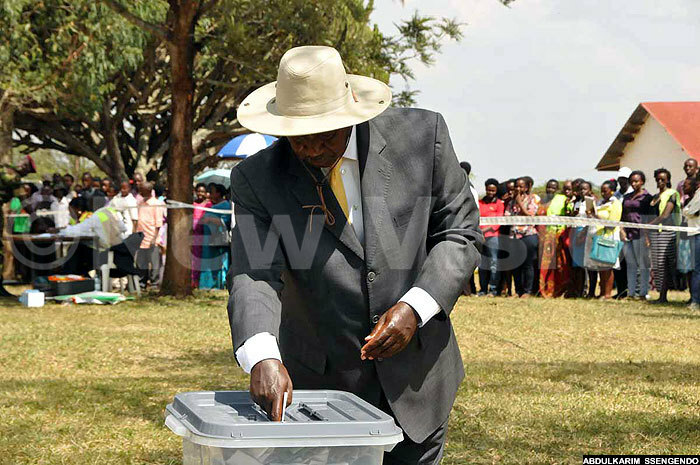
Mbabazi's lawyer tells court that the document supporting his submission was expunged, but Chief Justice Bart Katureebe says that's just an "excuse".
According to Twinobusingye's submission, Museveni had not been endorsed by all the National Resistance Movement (NRM) organs at time he submitted his papers, thus contravening the law.
So basically, the lawyer's submission is that Museveni was nominated by the Electoral Commission to stand for president before his party, the NRM, nominated him.
|
2.40pm: Attention. Court in session Lunch, check. Bottle of water, check. OK, we're back in court. Election petition hearing continues. Amama Mbabazi's lawyer Severino Twinobusingye is the one on the mic now. His submission is about the "illegal nomination of [President-elect Yoweri] Museveni by the Electoral Commission" in the previous presidential poll. 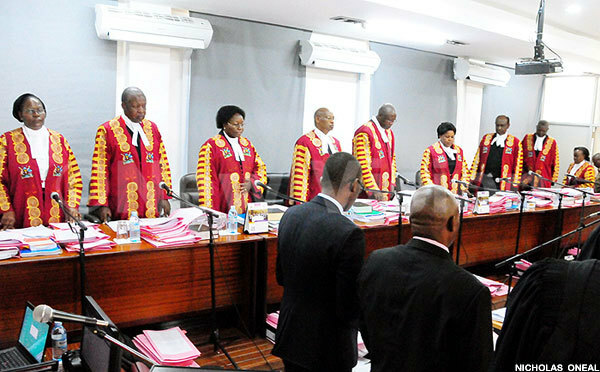
|
2.20pm: The conversation
We should be getting back to the courtroom soon. Before that, check out what people are saying about the hearing so far. The conversation continues on Twitter and on other platforms. So if you are a techie-of-sorts, use the hashtag #MbabaziPetition or #UgPetition16
Any thoughts? Find me here: @joekizza
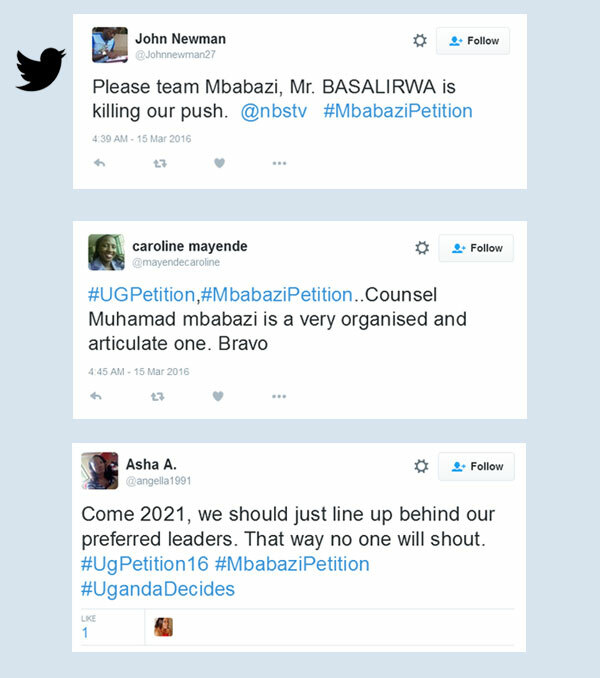
1.40pm: Through the camera lens . . .
Enjoying your lunch? Hope you are. But if you aint, then perhaps your eyes have better appetite for some shots from today's Supreme Court . . .

NRM lawyers discuss during a court break
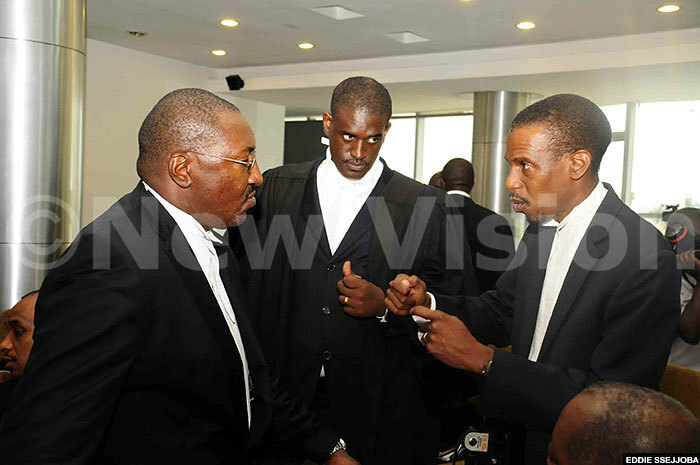
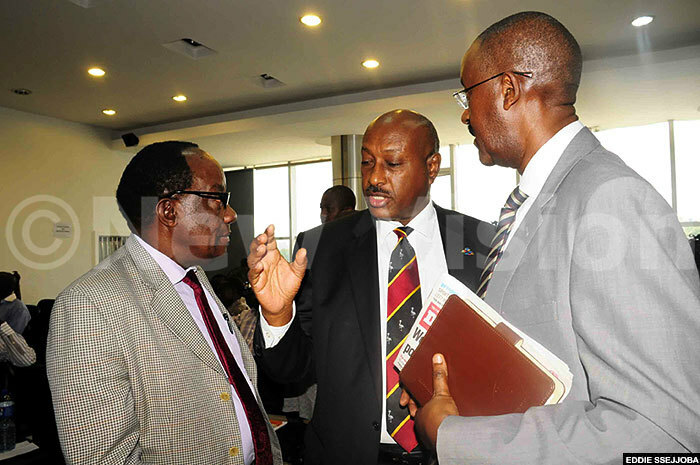
Attorney General Fred Ruhindi (centre) mingles with Electoral Commission chairman Eng Badru Kiggundu (left) and Electoral Commission secretary Sam Rwakoojo
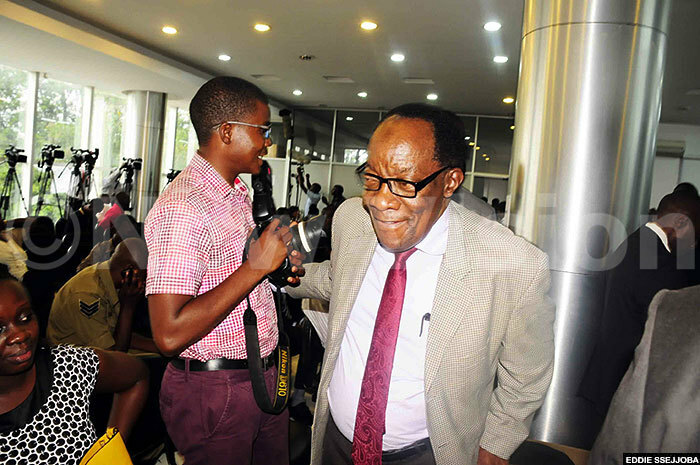
EC boss Kiggundu appeared in a jollier mood than the figure he cut on Monday while inside the witness stand during a lengthy cross-examination
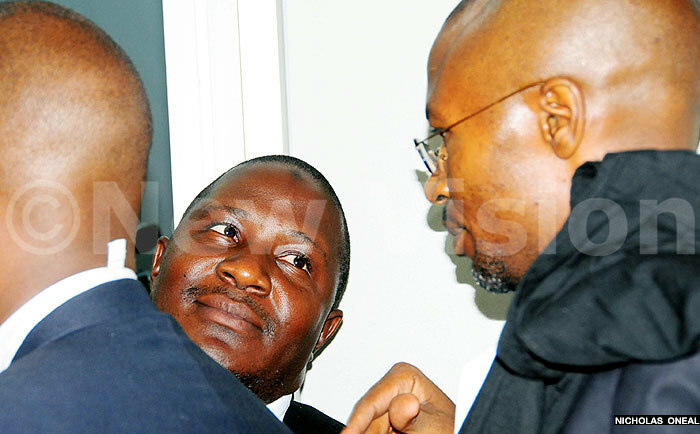
Amama Mbabazi's lawyers Severino Twinobusingye (right) and Asuman Basalirwa have a chat inside the courtroom
|
12.55pm: Lunch time. Court adjourns
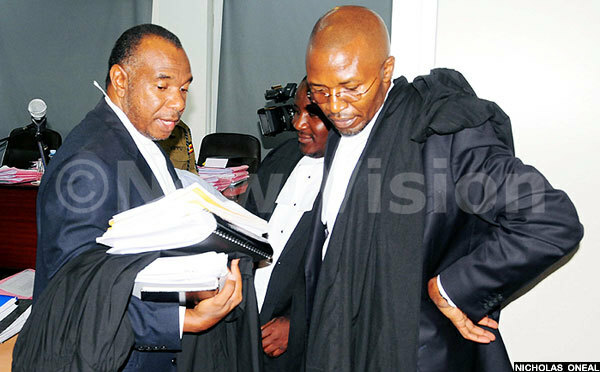
Feeling hungry? I bet you are. The Supreme Court will take a lunch-time break until 2.30pm. 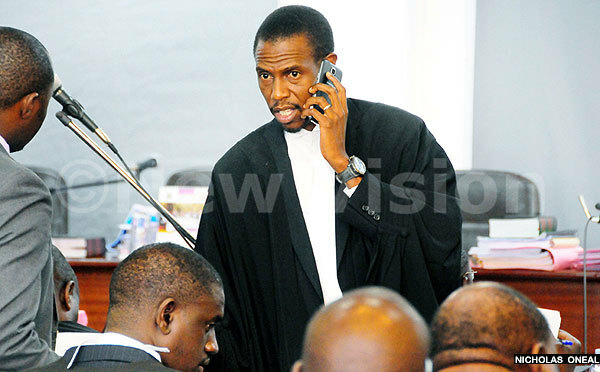
|
12.50pm: Voters' cards
On the matter of voters' cards, Basalirwa says that failure to issue them compromised identification of voters. He also draws reference to six under-aged registered voters who were turned away. "This would never have happened with voters' cards".
"It is illegal to exclude people who applied to be on the new register," Basalirwa tells court.
12.46pm: 'Fishing expedition'
Lawyer Basalirwa appears a little fidgety as he turns to the affidavit of a one Sezibeza Moses to back his disenfranchisement point. But he then switches affidavits, something that swiftly draws reaction from the Chief Justice, who asks the lawyer: "Mr Basalirwa, your fishing expedition, is not yet over?"
Basalirwa guides court on where in Jocelyn Kabasinguzi's affidavit he is partly reading, but then abandons it, too.This attracts the attention of Katureebe.
"Mr Basalirwa, when you stood up, I suppose you knew your case. You have a time limit; you must finish today."
Counsel Basalirwa says omission of many voters under the new national voters' register was a "grave omission that had consequences on this election".
The justices on the nine-strong coram insist that he provides evidence on claims that many voters on the 2011 national voters' register were missed out on the new national register.
12.35pm: 'How many were disenfranchised?'
Counsel Basalirwa says that replacing the 2011 national voter's register was irregular. The law, he says, does not envisage retiring and archiving national voters' registers. The law talks about compiling, revising and updating. Not retiring," says petitioner Amama Mbabazi's lawyer.
The lawyer says that the result of retirement and archiving was that there was disenfranchisement, to which Chief Justice Bart Katureebe asks: "How many were disenfranchised?"
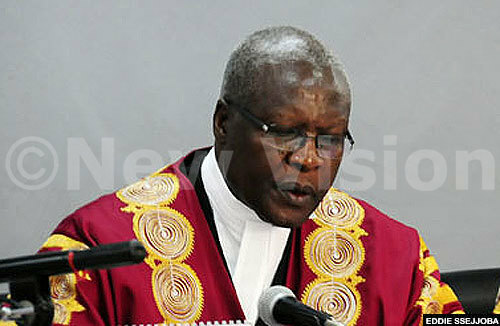
"The people who didn't register for national IDs did not participate in the 2016 elections," responds Basalirwa. Katureebe demands evidence to this.
12.25pm: 'Statutory violation'
"The duty to obtain data for the national voters' register cannot be ceded to any other authority in light of Article 62 of the Uganda Constitution. Article 62 of the Constitution grants the Electoral Commission independence," Basalirwa tells court.
He calls "a statutory violation" the failure of the Electoral Commission to compile its own data and instead use that from other agencies.
12.20pm: Non-compliance
"Taking over from his counterpart Mohammed Mbabazi, Counsel Asuman Basalirwa says he will handle the issue of non-compliance with regard to voters' register & voters' ID.
"Under Article 61, the Electoral Commission abdicated its role that mandates it to compile, maintain, revise and update the national voter's register," he says. "The Electoral Commission relied on data from the National Security Information System Task-force (NSIST) to produce a voters' register."
Basalirwa adds: "The duty to obtain data for purposes of establishing a national voters' register is an exclusive preserve of the Electoral Commission."
12.10pm: 'They did not'
"Having discharged our burden, it is incumbent on the second respondent [the Electoral Commission] to produce what they relied on to announce the presidential results," says Mbabazi.
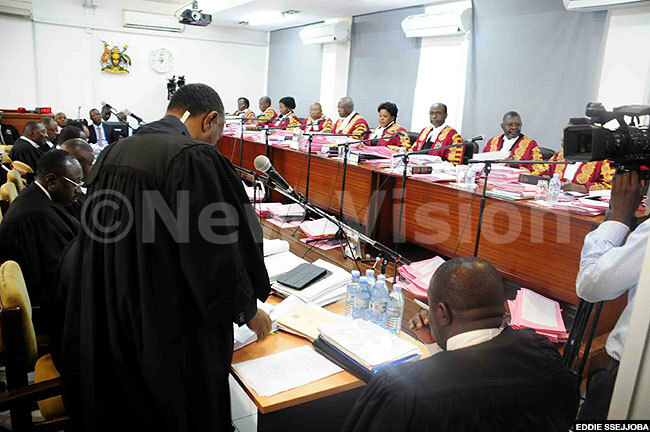
"They [Electoral Commission] say they had the forms. We are saying they didn't. They should produce them," he adds, calling on the Supreme Court to rely on an earlier separate ruling to direct the Electoral Commission to produce what they relied on to declare the February 18 presidential election results.
Lawyer Asuman Basalirwa will now take over . . .
12.05pm: 'Effect was deeper'
Mbabazi now reads from an affidavit by a one Bangi, a returning officer: "Voting materials arrived at 8.30pm," to which Mbabazi adds: "Materials were sent late. Here is someone saying materials came in at 8.30pm. The effect was deeper."
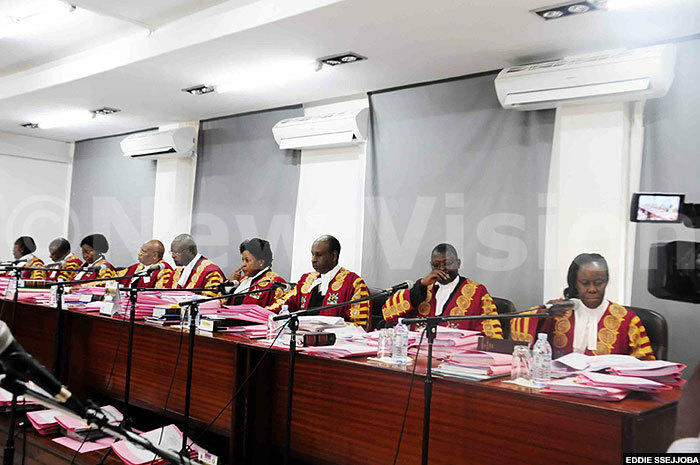
What happened in some places in Kampala and Mbabazi, argues the lawyer, was "more than late delivery of the voting materials". But Mbabazi will not go any further. He says he will not proceed with submissions on the matter of late delivery awaiting unavailable documents from the Electoral Commission lawyers.
11.50am: Voting materials
Court returns into session with Amama Mbabazi's lead lawyer Mohammed Mbabazi back on the mic to continue with his submission, with the focus now on the delivery of materials.
"Section 28 of the Presidential Elections Act on delivery of voting materials says that it should be done within 48 hrs before polling day. Dr. Kiggundu said it's 24 hours."
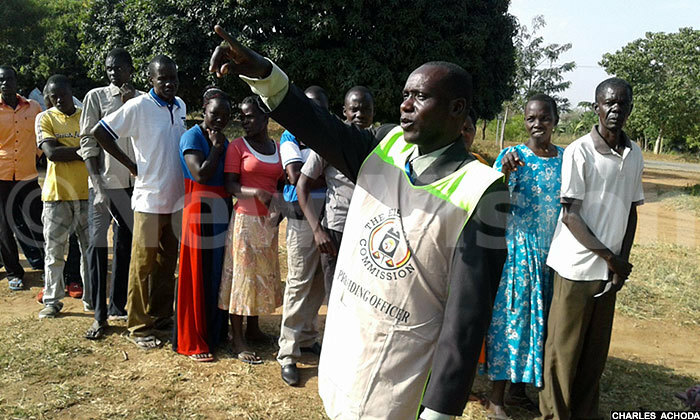
He points out that during the EC chairman's cross-examination on Monday, Kiggundu said he had apologized over the delayed delivery of voting materials, particularly in Kampala and Wakiso.
Mbabazi also says that Kiggundu said that two million (Kampala and Wakiso) out of 15 million registered voters were affected by late delivery of voting materials.
"On the 20th [of February], at the time of announcement of results, only 48% of registered voters in Kampala and Wakiso had voted," submits Mbabazi. "Why were the one million voters disenfranchised? They were not part of the announced results."
|
11.35am: And we're back Let's draw our attention back to the courtroom. Hope you have haven't spilled any tea on yourself. 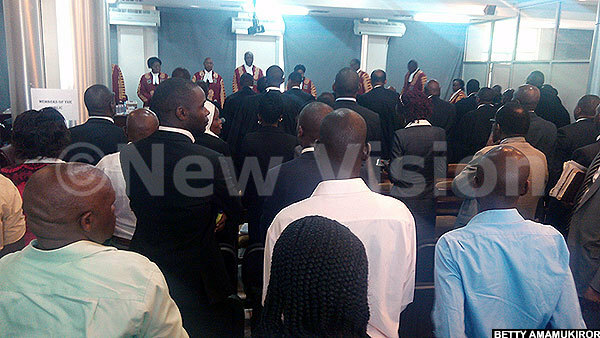
|
11.20am: In the spotlight
One man who featured predominantly in Monday's hearing was Eng. Badru Kiggundu, who heads the Electoral Commission. Missed the proceedings? GO BACK IN TIME HERE . . .
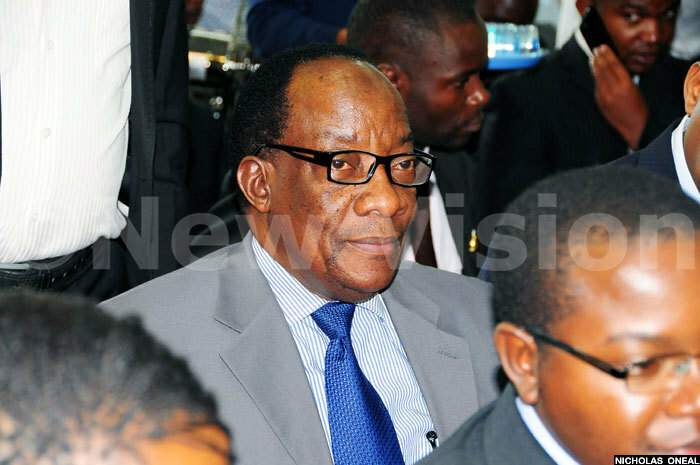
11.15am: Access granted
Just to take you back in time a little bit . . .
On Thursday last week, the Supreme Court ordered the Electoral Commission to give the lawyers of Amama Mbabazi access to the tally sheets and declaration of results (DR) forms from each district to support their petition challenging the victory of president-elect Yoweri Museveni of the NRM.
The Eng. Badru Kiggundu-led Commission obliged . . .
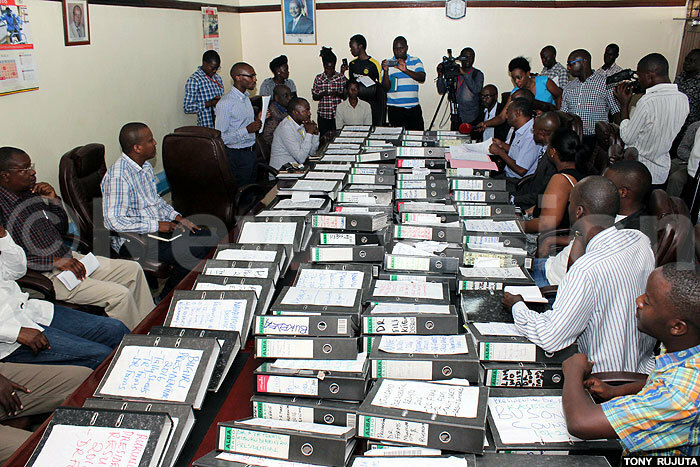
|
10.58am: BREAK TIME Court will go for a short break now. Time to catch up on some oranges. Court will be back in session at 11.30am. That should be enough time for you to blend yourself a glass of juice or fix a cup of tea and toast. 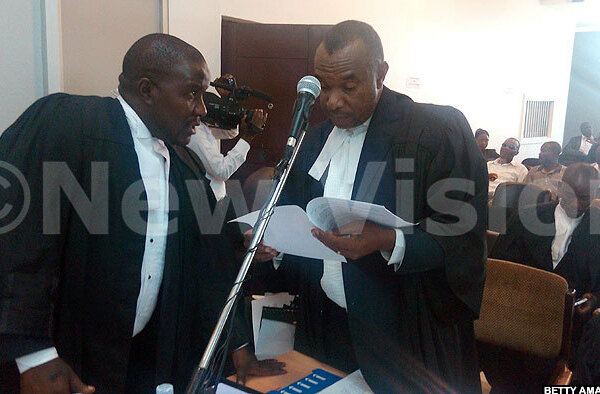
|
10.55am: Annul election?
Counsel Mbabazi also touches on the issue of biometric machines. "What they take in they don't bring out. Why?"
"[A one] Duncan who went for training on how to use biometric machines says verification takes 2 minutes. [EC boss Eng. Badru] Kiggundu says 30 seconds. Duncan who went for training on how to use biometric machines says it takes 8 hours to verify 540 voters."
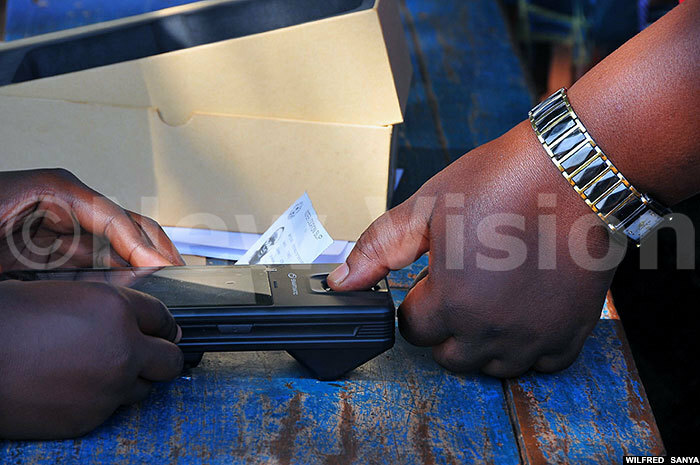
Mbabazi goes on: "Dr Kiggundu says the biometric machines were not configured to produce results. Is this credible?"
He reads another affidavit: "The use of the Biometric Voter Verification Kit made the polling process slow such that by 2.30pm [local time], many voters were still queued."
"If information on the BVVK had been availed, we would have been able to establish how long it takes. Thirsty seconds or two minutes? Information on the Biometric Voter Verification Kit would have been very relevant to this petition.
10.53am: Annul election?
"The evidence is clear. Declaration of results forms were not at the national tally centre," says Mbabazi, adding, "Was it legal? Under what law?
"Do we go back and do a fresh tally at district and national levels or, as we will submit, have the election annulled?"

10.50am: 'Directory or mandatory?'
"An election is a process - from registration to tallying and to declaration. All that has to be transparent and impartial. So where did the announced results come from? Is Section 56 [of the Presidential Elections Act] directory or mandatory? Our submission is that it is mandatory.
"We are saying you can't tally without results and can't declare without tallied results. We put the burden on the Electoral Commission," says Mbabazi.
10.45am: EC 'enacted own law'
Mbabazi says that their submission is that the February 18 presidential election "was not fair", arguing that the Electoral Commission "enacted its own law and used its own results to declare [NRM presidential candidate Yoweri] Museveni winner.
Remember that in this hearing, President-elect Yoweri Museveni is the first respondent while the Electoral Commission is the second respondent.
"Dr Kiggundu said they used scanned copies of the declaration of results (DR) forms, which haven't been availed."
He also makes reference to neighbouring Kenya, west African nation Ghana and Phillipines by saying that in these countries, there are laws for using electronic transmission. Mbabazi also questions the use of scanned copies of DR forms yet the law speaks of original copies.
"That fundamental departure [by the Electoral Commission] from the principles renders the outcome a nullity."
10.37am: Following . . . .
Deputy attoney general Mwesigwa Rukutana is following proceedings in the courtroom.
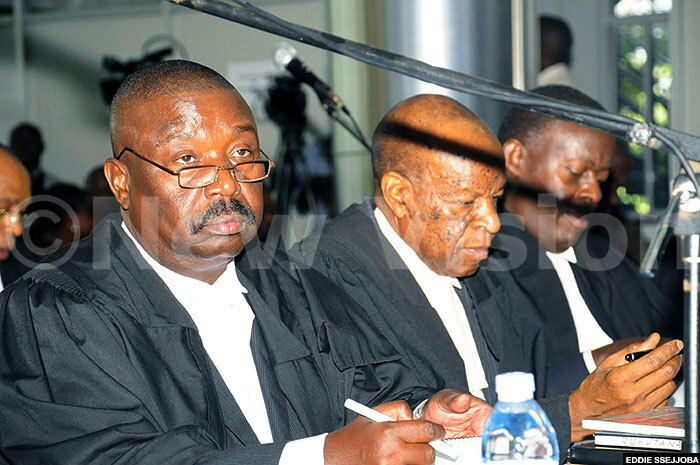
10.35am: Blocking of social media
Counsel Mbabazi says there was a lot of mystery in concealing the results and "uncoordinated lies".
He says social media, which was blocked by the Uganda Communications Commission (UCC) through the polling period, could have been been one way of sending declaration of results (DR) forms but that since access to it was blocked, that was not possible.
Reading off Inspector General of Police (IGP) Gen. Kale Kayihura's affidavit, Mbabazi says that social media was blocked due to "national security reasons".
He also talks of a one Kasigwa who, after identifying a broken seal on a ballot box and taking a picture of it before sharing it on social media, was summoned to a security meeting.
"The electoral process was not transparent. There was no fairness," says Amama Mbabazi's lead lawyer.
10.22am: Results a 'nullity'
Counsel Mbabazi further submits that: "We are saying that the results declared were a nullity," adding that there is something that is "being hidden. There's concealment of facts".
He goes on to read an affidavit of Mike Sebalu, saying that he gives a completely different picture of what happened at the national tally centre at Namboole.
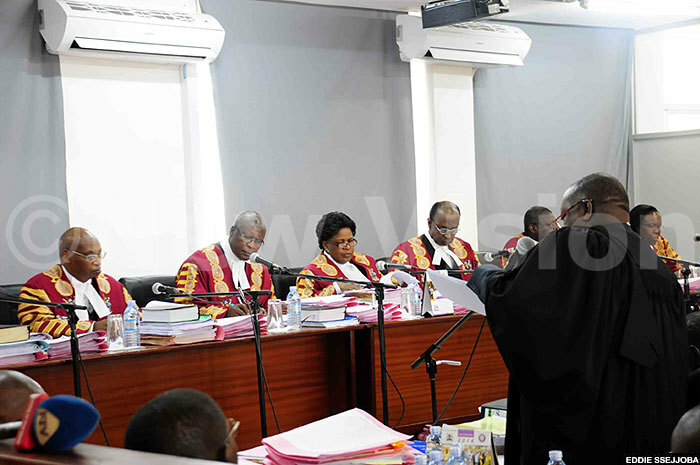
According to Mbabazi, "it's as though he attended another national tally centre". According to Sebalu's affidavit, results were broken down per polling station, contrary to what Namugera's affidavit says.
Court also hears that another server had to be transported from Kampala all the way to Kabale in western Uganda to transmit results to the national tally centre. The original one was slow, he says.
Mbabazi also says that results were announced yet according to the report, the server was down and that the Electoral Commission could not download the forms.
10.10am: 'No DR forms, no results'
Mbabazi says that their submission is thus: "If there were no DR [declaration of results] forms, there were no results."
He also submits that having DR forms at the national tally center (at Namboole), as per the Presidential Elections Act, is mandatory. The petitioner's lead lawyer also questions if any tallying was ever done at the national level at the national tally centre.
He goes on: "Dr [Badru] Kiggundu [the Electoral Commisson chairman] was asked whether he had DR forms at the national tally centre. He said "no". Even scanned copies were never produced."
"The requirement under Section 56 [of the Presidential Elections Act] was not complied with. That's our argument. Our attempts to get DR forms here were rendered futile. We asked for the documents, we have not yet received them."
9.50am: Submissions
Amama Mbabazi's lead lawyer Mohammed Mbabazi goes on with the submissions, picking out what he calls the "gist" of what witnesses said.
At the time of announcing of the February 18 presidential election results, there were no tally sheets or declaration of results (DR) forms at the national tally centre at Namboole, he reads.

Reading from a witness' affidavit, Mbabazi says: "There were 30 stations at the national tally center for agents to view results, and that there were no DR forms, return forms and tally sheets at the national tally centre." He says this was was non-compliance with Section 56 of the Presidential Elections Act.
|
9.43am: DAY TWO: Court in session Ladies and gentlemen, this is it! The second day of the election petition hearing is under way, and it's all taking place inside this building . . .
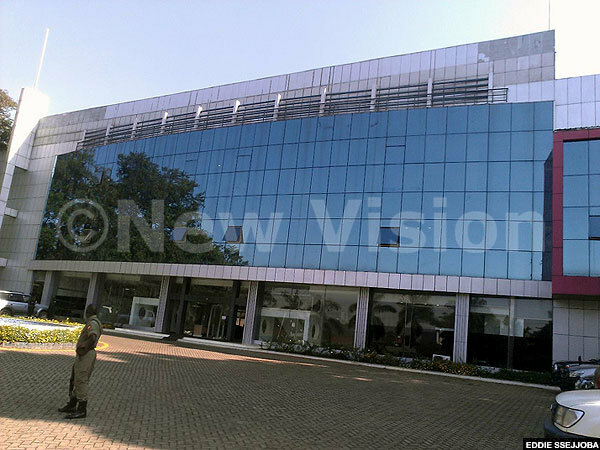
|
9.40am: Watch Monday's recap
As the nine justices enter the courtroom, check out a wrap-up of yesterday's proceedings. Quick!
9.30am: Media warned
The Supreme Court registrar, Tom Chemutai, has warned the media against holding press briefings within the court premises, according to New Vision's Betty Amamukiror, who is also at the Supreme Court right now.
Chemutai says that for security reasons, the court issued orders directing the media to hold briefings, if any, outside the court's gate. He asks the media to adhere to the rules.
9.25am: Checking in
It's just 9.20am local time and it's already super hot in Kampala. Promise of another super-hot day? Definitely. Be sure to have enough drinking water in stock. Hot Tuesday ahead.
Meanwhile, at the Supreme Court, the courtroom is starting to fill with people. Let your eyes pan around the room and you will catch the sight of Attorney General Fred Ruhindi . . . staring nearly directly in your view.

9.20am: Heavy files, packed day
Monday was a day of a number of highlights - at the Supreme Court, that is. First, we saw the court deliver its ruling on applications by two sets of groups interested in joining the Amama Mbabazi election petition.
First, the nine Makerere University law dons were allowed in - since they have the expertise that will be beneficial to the determination of the case, according to Justice Lillian Tibatemwa, who read the ruling on behalf of the nine-judge coram . . .
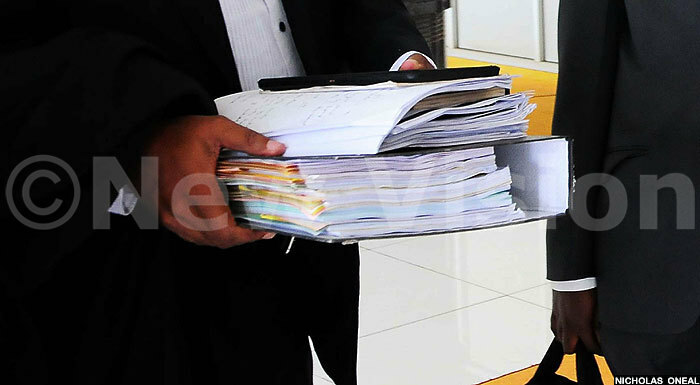
But the application by eight civil society organisations that acted as election observers was rejected. Reason? They did not have sufficient expertise to be accepted as a "friend of court".
Justice Arach-Amoko said that instead of accepting the CSOs as amicus curiae, they should give their reports and findings on elections to the petitioner (Amama Mbabazi) to rely on, since it is central to the matters in dispute in the petition.
9.10am: Missed the action?
Did you miss out on Monday's proceedings in court? Worry not, you can still catch up on what transpired inside a fully-packed courtroom with a coram of nine judges.
You can relive the proceedings ON THIS PAGE . . .
Or you if you fancy easing into your rocking chair and flipping through the dailies, you will find a mouthful of yesterday's Supreme Court session in today's New Vision newspaper . . .
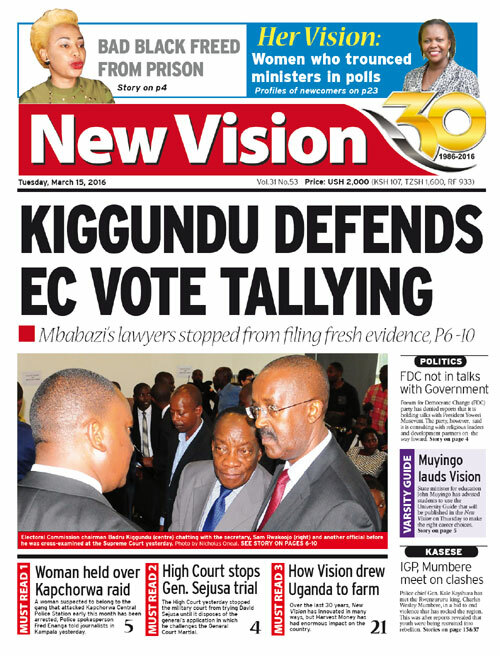
That's not all. You can also flip through today's New Vision digitally. HERE'S HOW
9.00am: Good morning!
Hello and welcome along to yet another day of court. It's the second day of a Supreme Court hearing of an election petition by former Ugandan prime minister Amama Mbabazi. As the petitioner, he is being represented in court by a team of lawyers - led by Mohammed Mbabazi - who will be back in the courtroom today.
We are carrying on from where we left yesterday (Monday).
Good morning!